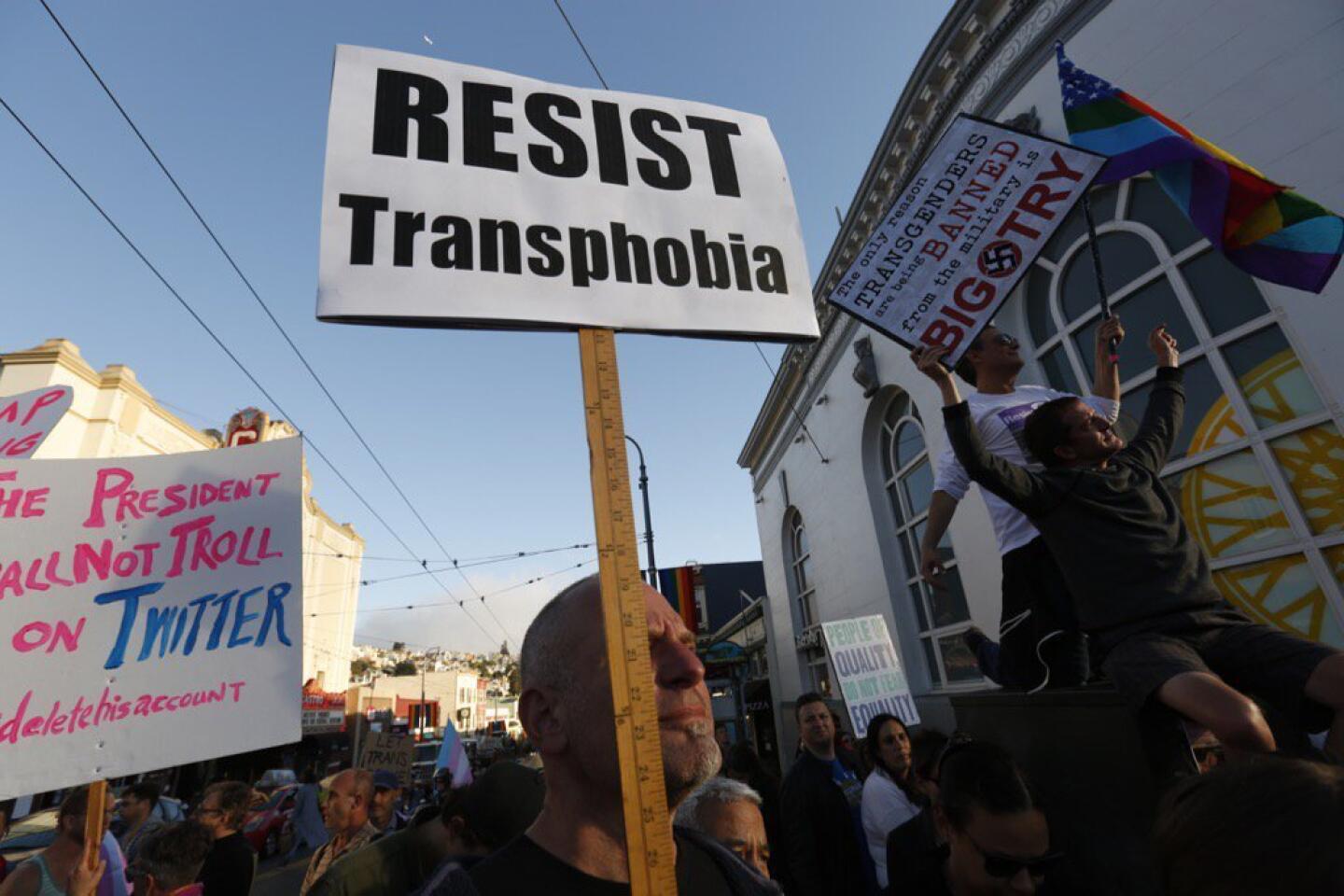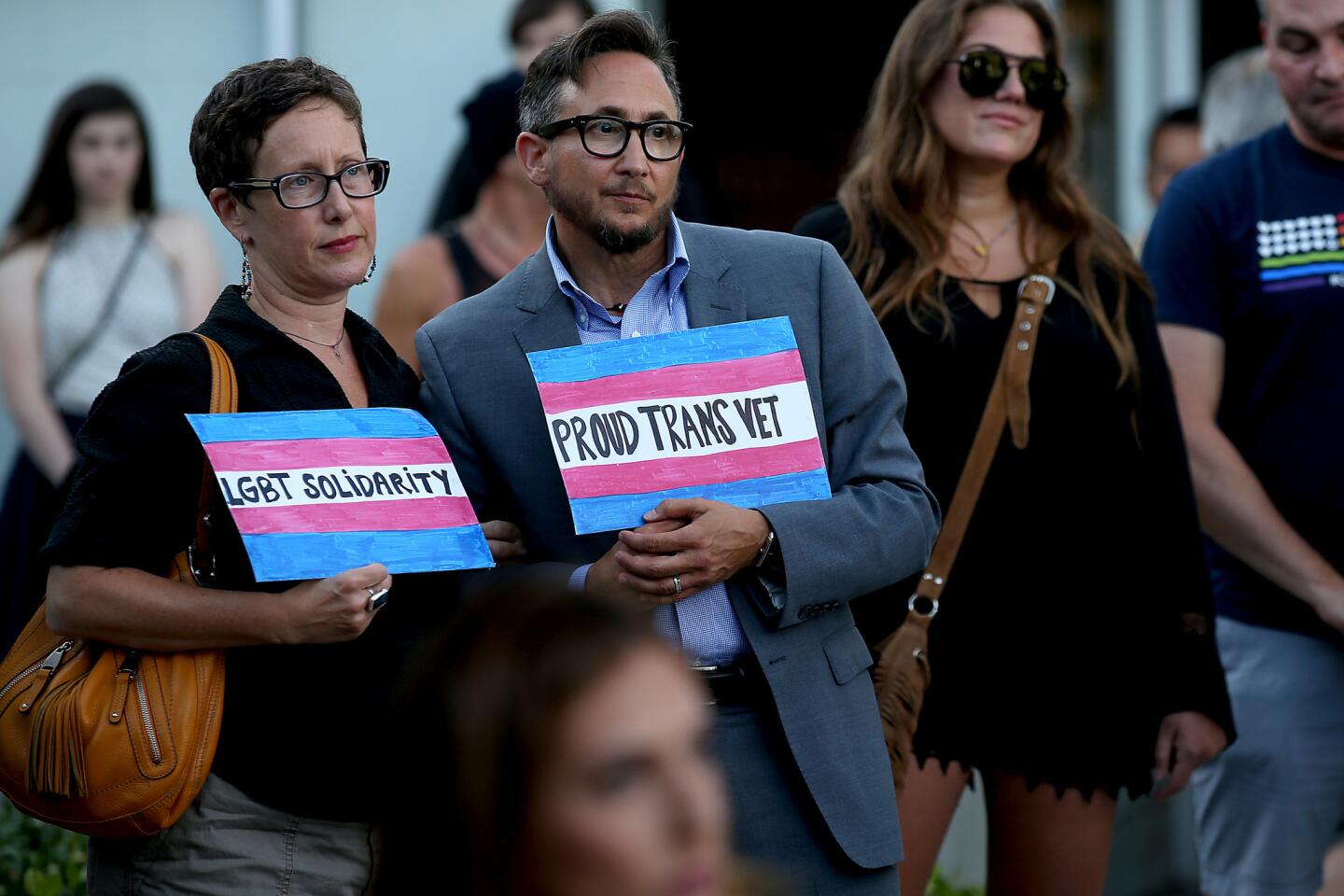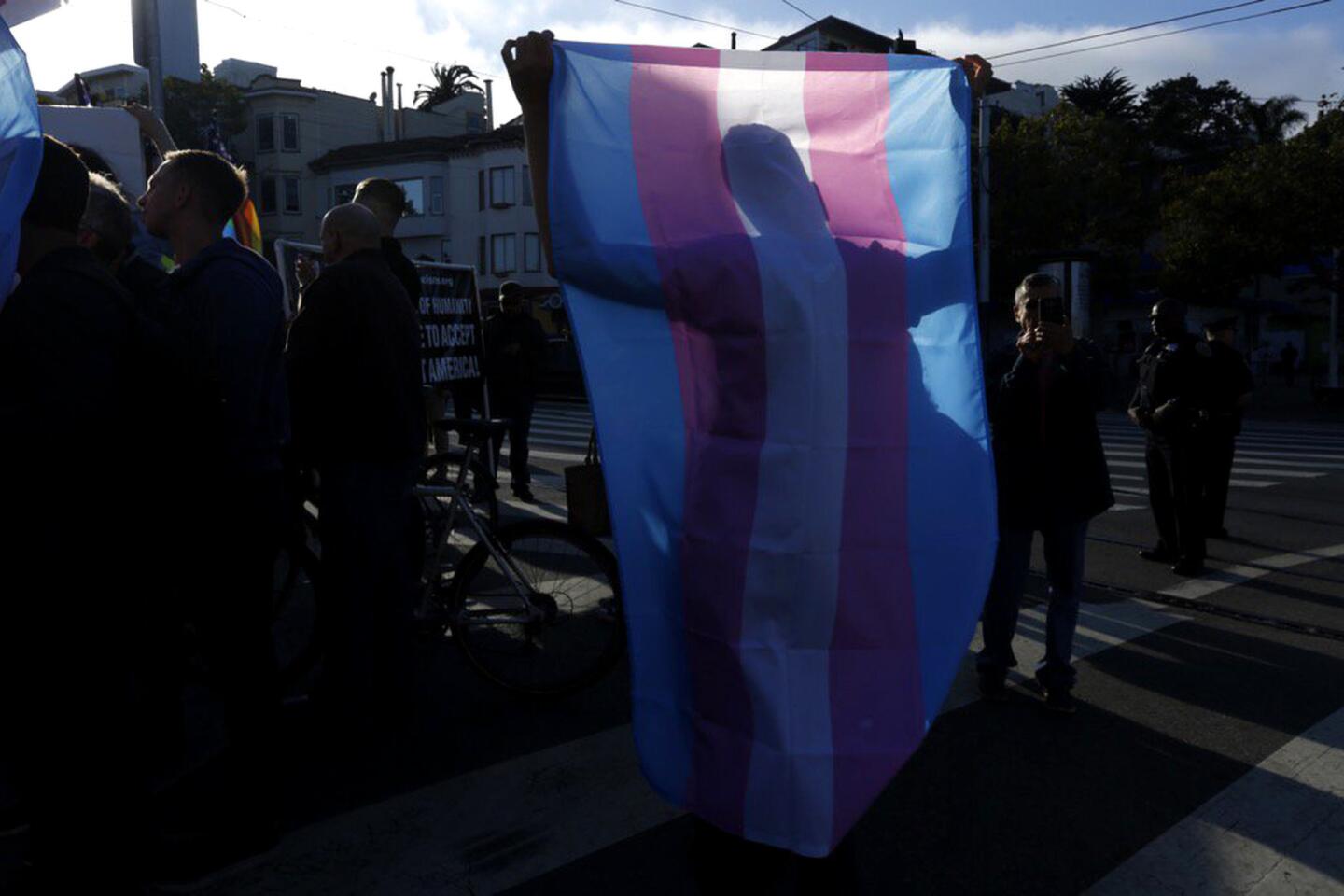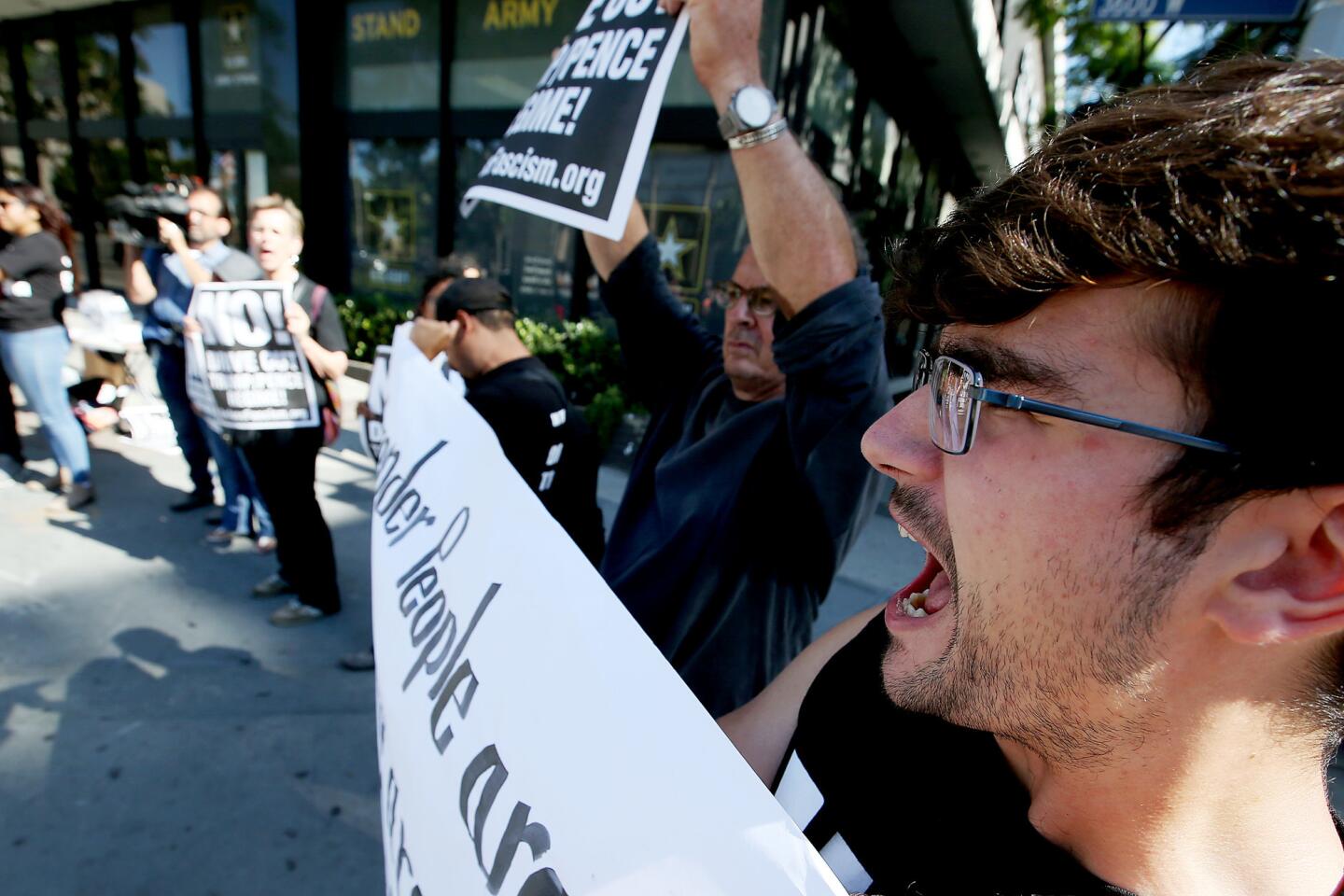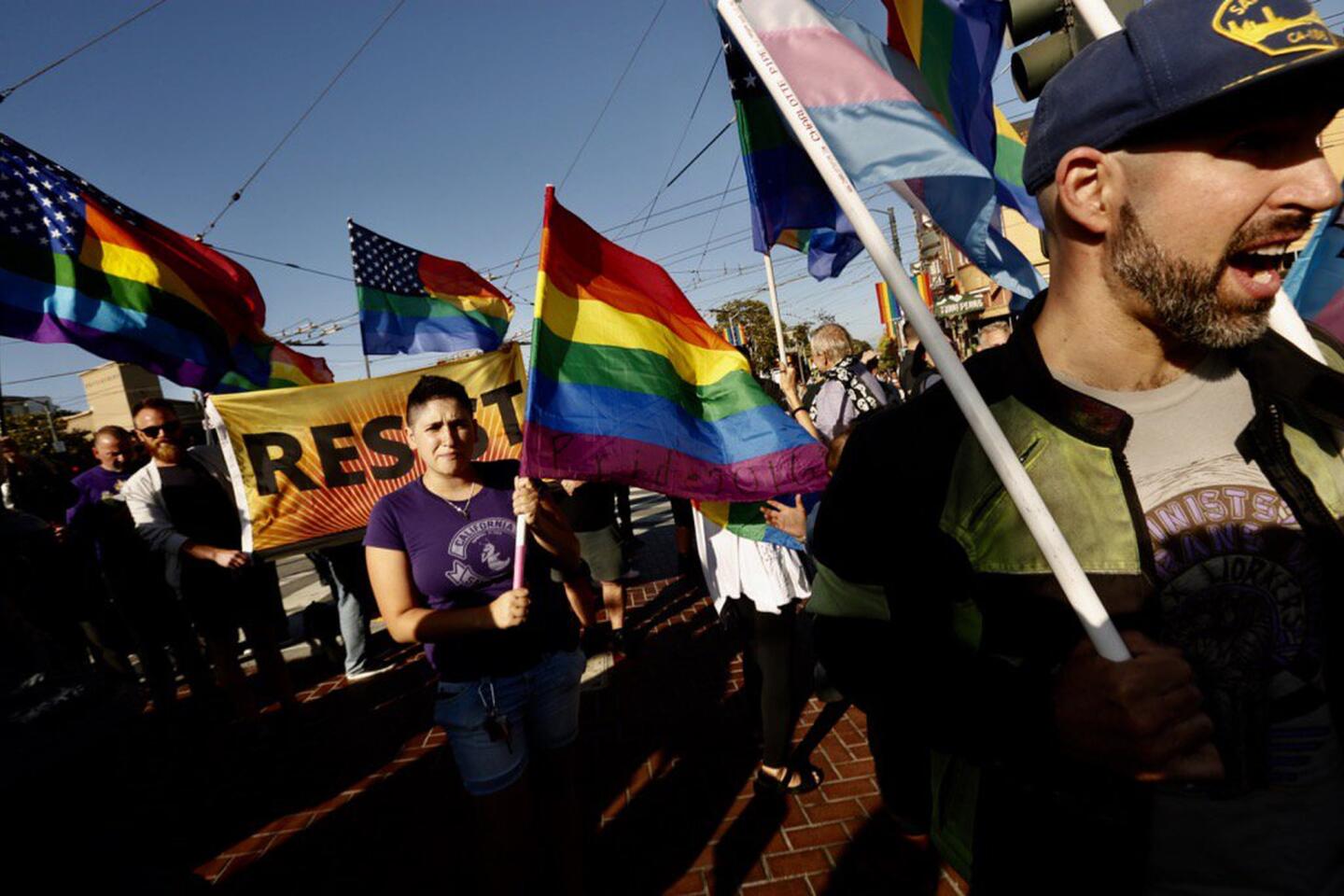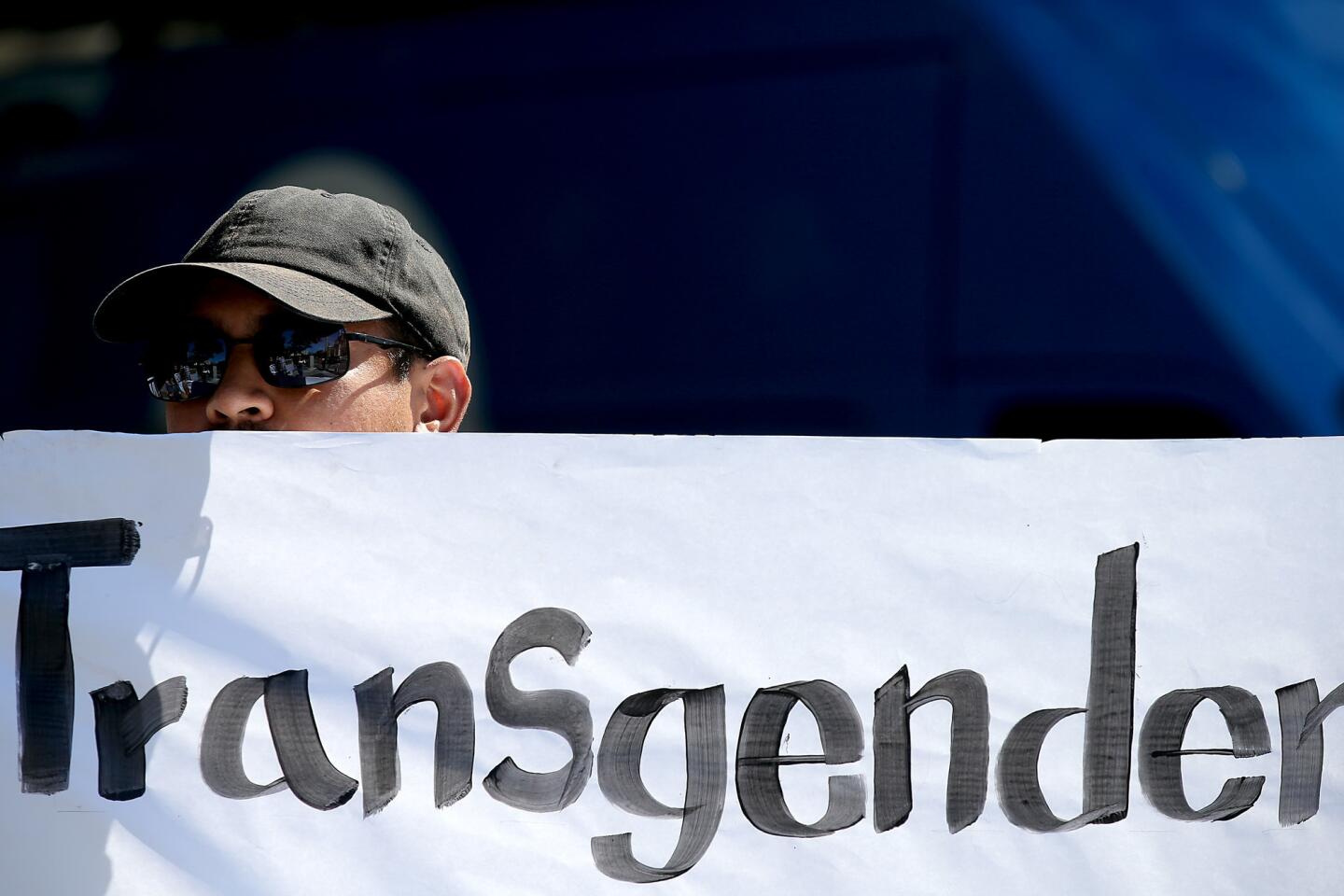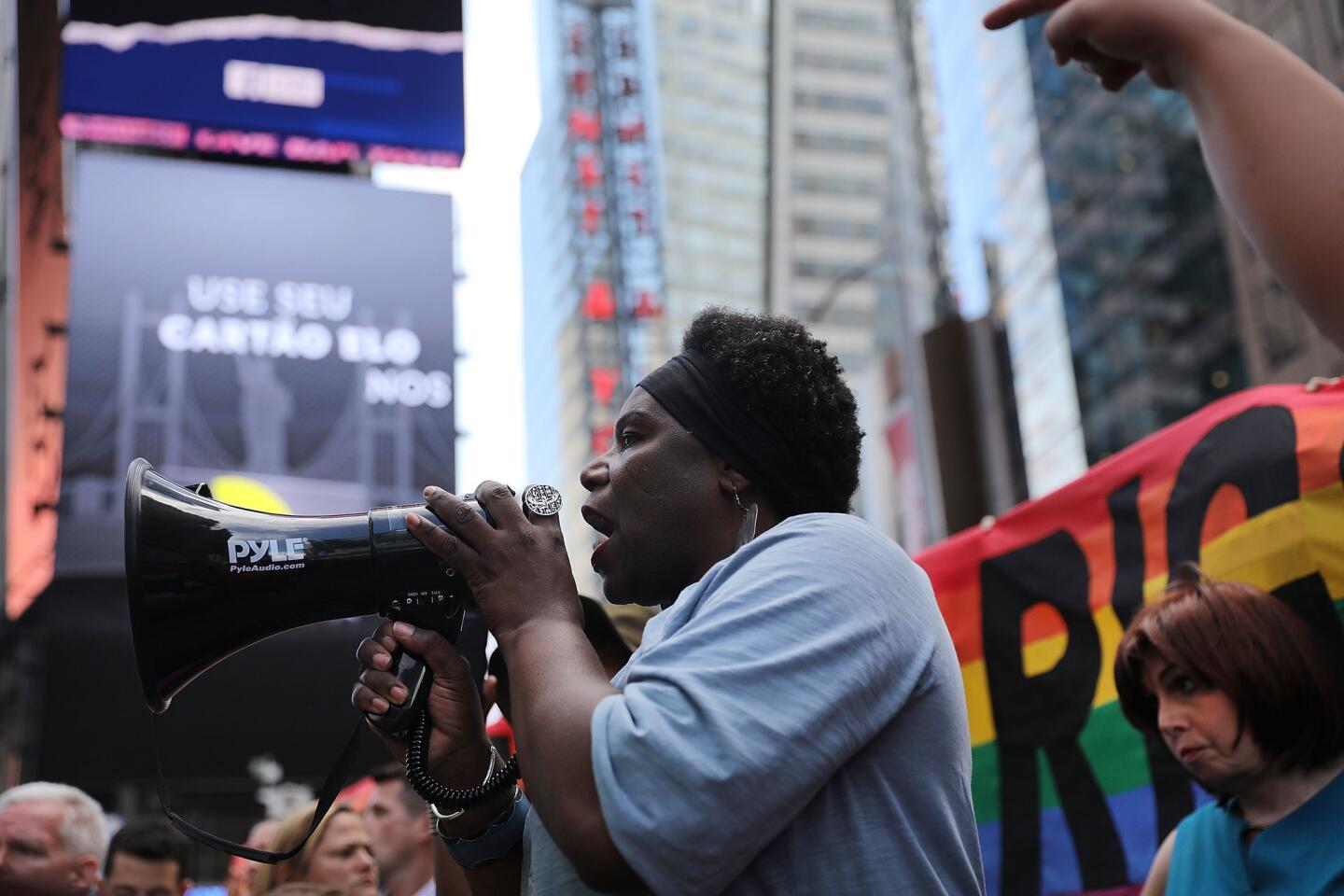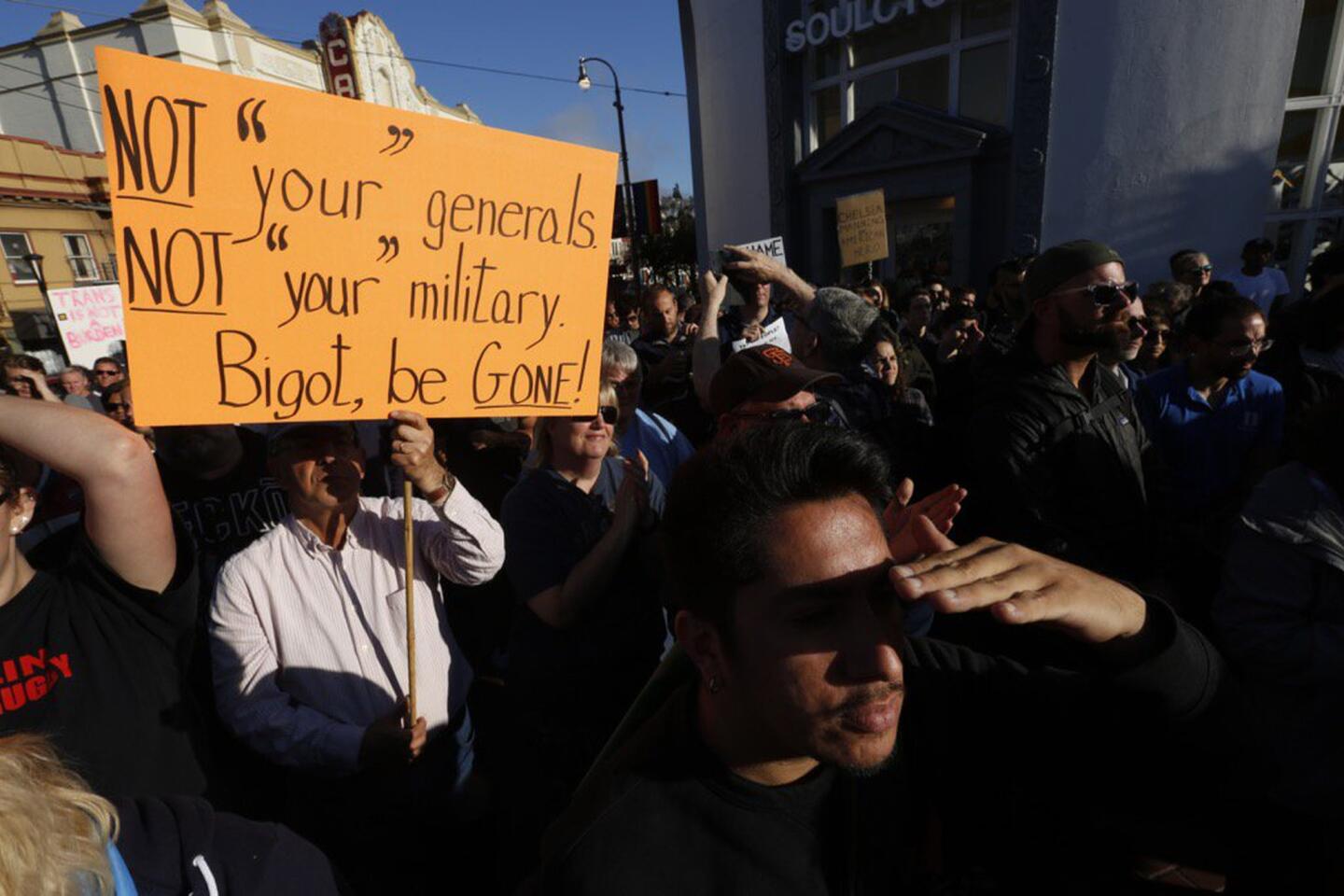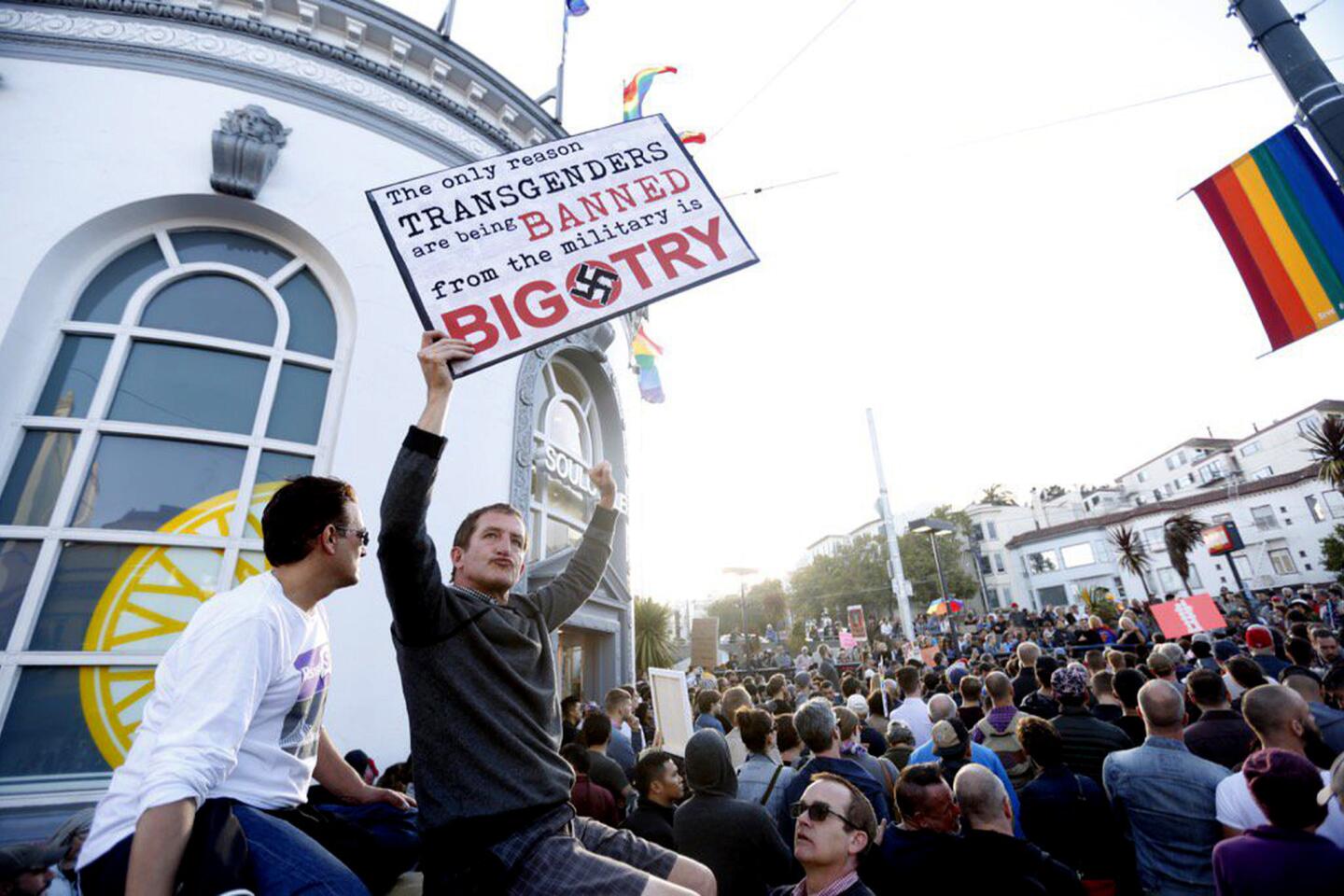Trump moves to bar transgender Americans from serving ‘in any capacity’ in the military
President Trump moved Wednesday to restore gender-based discrimination at the Pentagon, saying transgender people will be prohibited from serving “in any capacity” in the military, a shift that could affect thousands of Americans now in uniform and others hoping to serve.
In three posts on Twitter, Trump said the Pentagon “will not accept or allow” transgender people to serve, reversing an Obama administration policy imposed last summer to make the armed forces more inclusive and adding a high degree of uncertainty to military recruitment and retention rules.
The Pentagon keeps no figures on transgender personnel in the Army, Navy, Air Force and Marines. Outside groups estimate there are between 1,300 and 16,000 transgender troops in the military, which has an active-duty force of about 1.3 million.
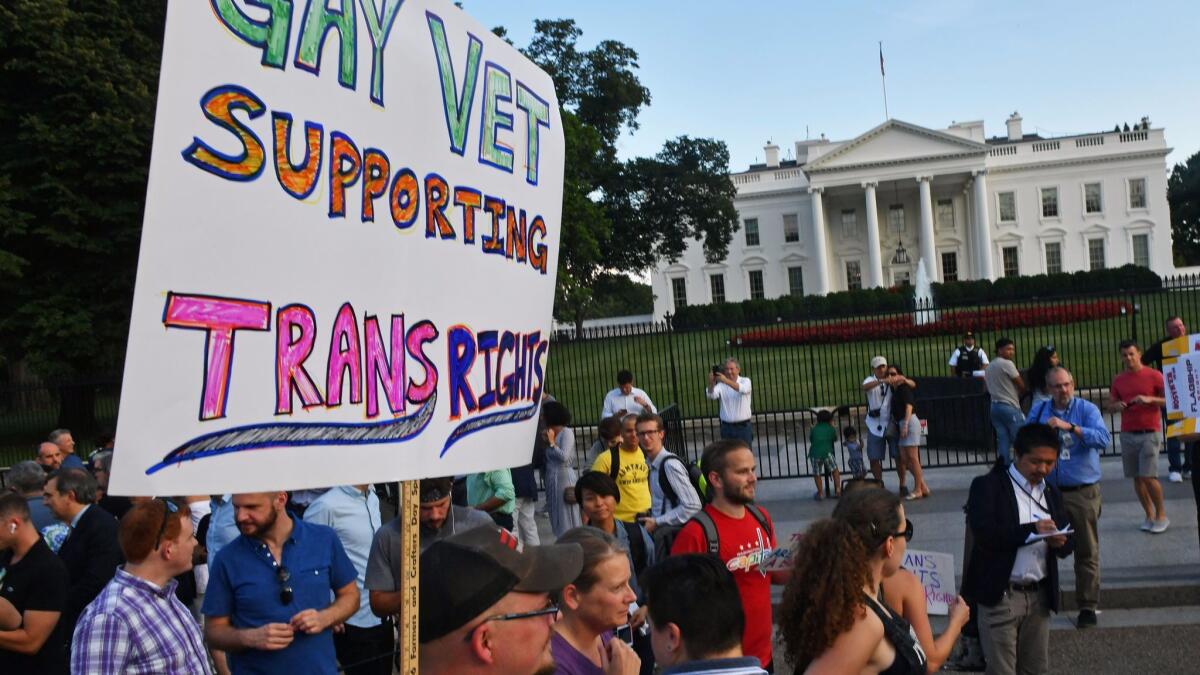
Secretary of Defense James N. Mattis is on vacation this week, and the Pentagon was caught off-guard by Trump’s tweet. So were senior lawmakers on Capitol Hill, where the president’s declaration took heavy flak.
Capt. Jeff Davis, a Pentagon spokesman, described the president’s posts as “new guidance” rather than an order from the commander-in-chief, and said the Pentagon would revise its own guidance to the uniformed services “in the near future.” He referred all questions to the White House.
Several powerful Republican lawmakers — including Sens. John McCain of Arizona, Richard C. Shelby of Alabama and Orrin G. Hatch of Utah — expressed outright opposition, suggesting the policy might get slow-rolled in hearings and studies.
McCain, chairman of the Senate Armed Services Committee, all but urged the Pentagon to ignore Trump’s tweets, saying there is “no reason” to change current policy.
Officials said nothing will happen until the White House National Security Council issues written guidance to the Pentagon.
Sarah Huckabee Sanders, the White House spokeswoman, was unable to say whether transgender service members could stay in the military or would be forced out.
The White House and the Defense Department will “have to work together to lawfully determine” how to implement Trump’s decision, Sanders said. She did not say when that might occur.
In his Twitter posts, Trump said he had consulted with “my Generals and military experts” in deciding to ban transgender troops from service.
“Our military must be focused on decisive and overwhelming victory and cannot be burdened with the tremendous medical costs and disruption that transgender in the military would entail,” he wrote.
A Rand Corp. study commissioned by the Pentagon last year projected the medical costs associated with transgender troops as negligible — between $2.4 million and $8.4 million a year, or about 0.1% of Pentagon healthcare spending.
Under the policy that began last July, some transgender service members have begun gender reassignment surgery and other medical procedures as long as they were deemed necessary by a physician.
Those troops drew broad support on Wednesday, with McCain, a decorated military veteran, leading the way.
“Any American who meets current medical and readiness standards should be allowed to continue serving,” he said. “There is no reason to force service members who are able to fight, train, and deploy to leave the military — regardless of their gender identity.”
He called for finishing a Pentagon study on the medical obligations, impact on military readiness and other issues regarding transgender service members.
“I do not believe that a new policy decision is appropriate until that study is complete and thoroughly reviewed by the Secretary of Defense, our military leadership and the Congress,” McCain added.
Lesbian, gay, bisexual and transgender advocacy groups vowed to challenge Trump in federal court if self-identified transgender service members are forced out of the military.
“We will sue if the president goes beyond the tweet and actually kicks them out,” said Matt Thorn, head of the OutServe-Servicemembers Legal Defense Network, a Washington-based group that seeks LGBT equality in the military.
Legal scholars said it’s not clear whether the president can reimpose discrimination in a federal department.
“There is a strong argument that substantively speaking the policy change would violate [the] law against sex discrimination,” said Libby Adler, a constitutional law professor at Northeastern University’s School of Law. “It depends on what prohibitions against ‘sex’ discrimination are construed to encompass.”
The most famous transgender military veteran, Chelsea Manning, mocked Trump’s decision in her own tweets Wednesday.
“So, biggest baddest most $$ military on earth cries about a few trans people but funds the F-35? sounds like cowardice,” she wrote.
Manning began treatment in a military prison after she was convicted in 2013 of leaking classified material to WikiLeaks while serving as an Army soldier in Iraq, then known as Bradley Manning. President Obama pardoned her just before he left office, and she was released from prison in May.
Trump’s disclosed his ban on the 69th anniversary of the day President Truman signed Executive Order 9981, which ended official racial discrimination in the military.
Changing the transgender policy would mark a return to the status quo that existed before last July, when the Pentagon lifted a long-standing ban against transgender men and women serving openly.
The 2016 policy placed protection of gender rights on par with race, religion, color, sex and sexual orientation as part of a broader initiative to bring the military in line with society.
For the first time, transgender service members could serve openly. Armed services had to provide medical and training plans and arrange full implementation by this July 1.
Mattis had pushed that deadline back by six months, and Trump has now moved to eliminate the policy entirely.
Several activists said Trump’s call to bar transgender soldiers posed dangers to the broader transgender community.
“It’s dangerous not only to our service members but to trans people across the nation, because it sends a message that we’re not equal, that we’re not good enough,” said Emma Shinn, a Denver attorney and former Marine who served six deployments, including a combat posting in Fallujah, Iraq. She transitioned to female after leaving the military in 2014.
“I’m enraged, because this puts people at risk,” agreed Terrance Kayton, 34, an Oakland activist who transitioned to male after serving in the Navy from 2001 to 2005.
Ellie Lader, an Iraq war veteran who served nine years in the Marines before her transition to female, called Trump’s proposal “mean-spirited” and unnecessary.
“Our community needs ... to fight this decision,” she said. “We have friends on active duty who are deeply concerned.”
The Pentagon announcement last summer lifting the ban on transgender men and women serving openly in the military was part of the Obama administration’s “Force of the Future” initiative, which aimed at making the the straight-laced, male-dominated U.S. military more inclusive. In 2015, the administration opened all combat positions to women and in 2016 appointed the first openly gay secretary of the Army, Eric K. Fanning.
The Obama plan allowed transgender service members currently on duty to immediately serve openly. Armed services had to come up with medical and training plans and were given until July 1, 2017, for full implementation, until Mattis pushed that date back.
The Pentagon has not had a precise count of how many transgender people are in the services because they faced discharge if they revealed their identities.
There are as many as 6,630 transgender people who will be affected by Trump’s decision, according to a 2016 study by Rand Corp., the Santa Monica-based think tank.
The study, commissioned by the Pentagon, estimated that between 29 and 129 transition-related treatments could be initiated by transgender service members.
As a result, U.S. military healthcare costs are expected to increase by between $2.4 million to $8.4 million.
Gender reassignment surgery and other treatment deemed medically necessary by a physician was to be covered.
Under the old rule, the Pentagon banned transgender troops from openly serving. If they revealed their transgender identity, they could be kicked out or denied reenlistment.
Times staff writer Matt Pearce in Los Angeles contributed to this report.
Twitter: @wjhenn
ALSO:
Climate change is real: Just ask the Pentagon
Trump administration stops disclosing troop deployments in Iraq and Syria
U.S. launches dozens of missiles at Syria in response to chemical weapons attack
More to Read
Get the L.A. Times Politics newsletter
Deeply reported insights into legislation, politics and policy from Sacramento, Washington and beyond. In your inbox three times per week.
You may occasionally receive promotional content from the Los Angeles Times.
